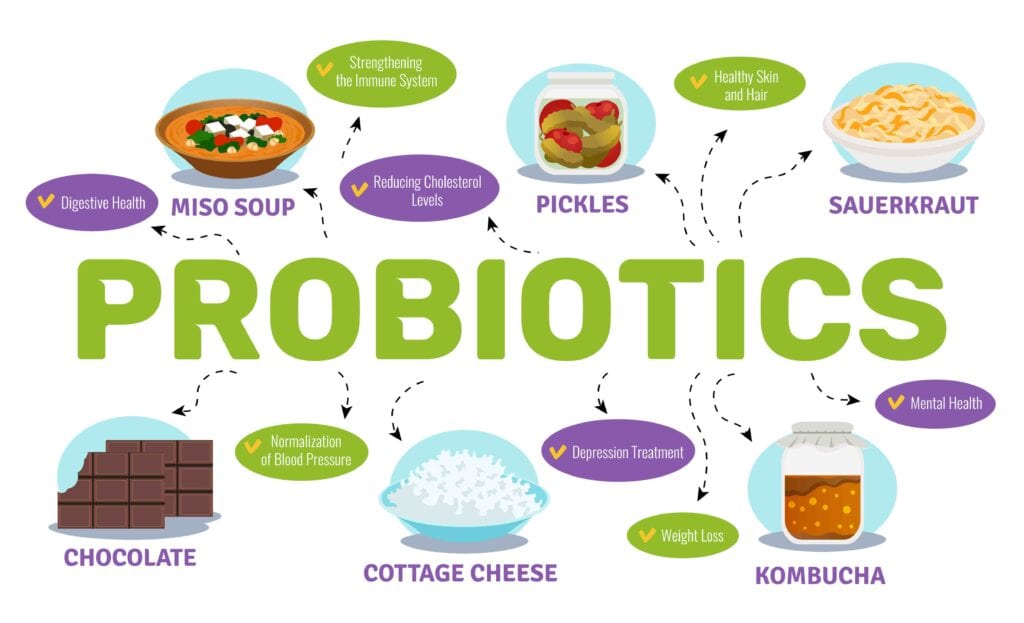Probiotics' Benefits for Digestive Health: Nurturing Your Gut
There is a good reason why we’ve been hearing about probiotics for the last several years. They play a crucial role in our digestive process.
However, probiotics’ benefits extend beyond digestion. They are living microorganisms—good bacteria—that provide physical, as well as mood and cognitive benefits to their host: You.
So, what are the sources of probiotics and how do they work? And, most importantly, how can they help restore the delicate balance within our physical body?
Digestive System 101: The Gut Microbiota
Let’s first look at the digestive system. It is made up of organs that help the body break down and absorb food. The journey starts with the mouth and esophagus which manage this process—helping food particles travel to the gastrointestinal tract.
Next, the stomach breaks food down into nutrients that our body can continue to absorb and utilize as energy. The stomach produces gastric juice that chemically digests proteins. The result is then absorbed into the bloodstream as nutrients that our body uses as energy.
Beyond nutrient absorption, the digestive tract houses a complex ecosystem of microorganisms, collectively known as the gut microbiota. They play a vital role in various physiological processes, including:
- Maintaining a balanced immune response
- Synthesizing certain vitamins
- Contributing to the production of neurotransmitters that impact mood and cognitive function
However, the modern lifestyle, characterized by processed foods, stress, and antibiotics, can disrupt the delicate balance of the gut microbiota, resulting in:
- Digestive discomfort
- Weakened immunity
- Other health issues
An imbalanced digestive system can manifest in many ways, often with symptoms that extend beyond digestive discomfort. Here are common signs to watch out for:
- Upset stomach
- Weight changes
- Sugar cravings
- Sleep disturbance or unusual fatigue
- Skin irritation
- Food allergies
While an imbalanced microbiota may not be the sole reason for these challenges, it is generally one of the first areas to target in restoring balance. This is where probiotics come into play.
Enter: Probiotics
Did you know there are roughly 100 trillion types of bacteria living in the human gut? This comprises good and bad bacteria that constantly battle each other to keep our digestive system balanced.
Probiotics are the good guys. They are live bacteria and yeasts beneficial to our health, especially for our digestive system. The most common bacteria found in probiotics are Lactobacillus, Bifidobacterium, Saccharomyces boulardii yeast, and others.
Probiotics’ benefits come in a variety of forms. One way is by competing with harmful microorganisms for resources and attachment sites along the small and large intestine lining. Probiotics can prevent the growth of pathogenic bacteria and help maintain a healthier gut environment. They can also produce compounds like short-chain fatty acids, which support a healthy intestinal microbial barrier and control inflammation.
When consumed, probiotics influence gut microbiota composition, promoting a more diverse and balanced microbial community. This, in turn, can enhance digestion, improve nutrient absorption, and bolster the immune system.
Sources of Probiotics

Yes, probiotics already live in your body and do their job. But sometimes they need a little help, especially when you take antibiotics or maintain a diet that doesn’t support a thriving probiotic environment.
Probiotics can be found in a variety of foods and dietary supplements. Fermented foods are among the most well-known, natural sources of probiotics, including:
- Yogurt
- Kefir
- Sauerkraut
- Kimchi
- Miso
- Kombucha
When consumed, these foods introduce live probiotic cultures into the digestive system, promoting a healthier gut microbiota.
However, it’s important to remember that these foods don’t contain just probiotics. There are also added sugars and ingredients that may not be beneficial.
Modern Life Has Depleted Our Gut Flora
Human beings have gotten our bacterial gut flora from our foods and our less-than-sanitary environment for hundreds of thousands of years. Most of the bugs in our gut come from soil–a nice way of saying dirt. Until recent history, most of what we ate came from our gardens, complete with the dirt it grew in. Now, the multiple steps and repeated washing in our industrial-level farming, followed by the scrubbing, washing, and rinsing at the supermarket before we get the food home, followed again by many people washing it yet again to remove the pesticides and chemicals involved in its growth and preservation, means there is not much in the way of soil bacteria and viruses left for our guts.
We now know that being too clean is not good for us. Kids raised on farms and rural areas with close contact with animals and lots of grubby, dirty stuff rarely develop allergies or autoimmune diseases. Even kids raised with a dog who is allowed to run free outside and then come inside where the child buries his face in the dog’s fur gets licked on the mouth and picks up the animal’s unsanitary lifestyle second-hand, have far fewer immune-mediated problems than kids raised in a super “clean” household.
There is even a difference in people born via a sterile Cesarian Section compared to those delivered via a vaginal birth. Children coming thru the vagina pick up and swallow mom’s vaginal secretions, mucus, and loads of living flora on their journey to the outside world, including a fair bit of mom’s poop that inevitably is pushed out as part of the birth process. These kids have more competent immune systems than their C-Section fellows.
The upshot is that we are part of the earth, and the earth is part of us. That is how we were designed, and the farther we separate ourselves from our natural environment, the worse off we are.
How to Incorporate Probiotics into Your Diet

Adding probiotics to your routine promotes better digestive and overall health. Let’s examine some important considerations.
Choose the Right Probiotic Strains
When selecting a probiotic supplement, consider the specific strains of bacteria or yeasts. Different strains have differing effects on the body. Some are more effective at addressing certain digestive issues, while others might have broader benefits. Consult a healthcare professional to determine which strains are best for your needs.
Select High-Quality Supplements
Be mindful to choose products from reputable brands known for their quality and efficacy. Look for supplements that provide clear information about the strains and colony-forming units (CFUs) in each dose.
Follow the Recommended Dosage
Always follow the recommended dosage instructions provided on the supplement’s packaging or as advised by a healthcare professional. Taking too many probiotics may not necessarily provide better results and could even lead to temporary digestive issues.
Consider Timing
When you consume your probiotics can influence their effectiveness. Some people find it helpful to take probiotics with meals to aid digestion and minimize potential side effects, like bloating. However, this can vary depending on the specific supplement and individual preferences.
Be Consistent
Consistency is key when taking probiotics. Incorporate them into your daily routine and take them as recommended for the best results. Probiotics work well when taken regularly over time.
Diversify Your Sources
In addition to supplements, add natural food sources of probiotics to your diet. Include fermented foods like yogurt, kefir, sauerkraut, kimchi, miso, and kombucha to introduce a variety of probiotic strains.
Monitor Your Body’s Response
Pay attention to how your body responds to probiotics. While some people notice improvements in digestion quickly, others might take longer to see noticeable results. Be patient and give your body time to adapt.
Consult a Healthcare Professional
If you have specific digestive issues or health concerns, it’s best to consult a healthcare professional before starting any new supplements, including probiotics. They can provide personalized recommendations based on your individual needs.
Probiotics Benefit the Entire Body
Remember that individual responses to probiotics vary, so what works well for one person may not work for another. It is essential to listen to your body and adjust as needed. The goal is to create an environment where probiotics can support your gut and overall health.




